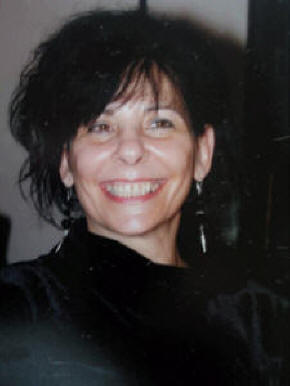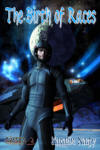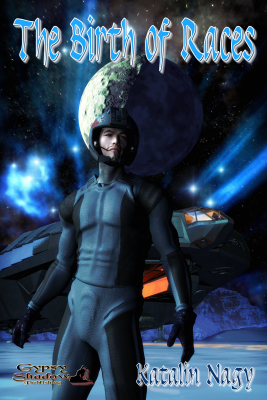Katalin Nagy
 |
I was born in Budapest Hungary. I left Hungary when I was 23 and came to Australia as a refugee. Learning English and being a mother took up much of my time. Eventually I completed a Bachelor of Health Science in Complementary Medicine and now for the last eight years I’ve practiced as a naturopath and nutritionist. I am married with a very supporting husband and an adult son. I have two beautiful oriental cats spoiled by the whole family.
FACEBOOK
|
New Title(s) from Katalin Nagy


Click on the thumbnail(s) above to learn more about the book(s) listed.

|
Many centuries in the past, a fraction of humanity left the Solar System to settle in their new home forming a united empire, the Federation. The accidental finding, by Firl and his friends, of an alien digging on one of the Federation settlements, led to the discovery of altered human genetic material in a number of people visiting the site.
Soon Federation is torn apart by political and personal turmoil caused by the friction arising between the affected and the non-affected. The affected split to form the Elites, eager to find out about their alien heritage and the Morphiks, keen to embark on their own evolution. Eventually Federation breaks up and in its place three separate empires form populated by the three races.
Excerpt
Word Count: 84000
Buy at:
Smashwords (all formats) ~
Barnes and Noble ~
Amazon
Price: $4.99 |
|
|

|
It has been many years since Simon moved
back to Earth to take up a position in the Zone’s police force,
after his relationship with beautiful Solace came to an abrupt
end.
Lucy is forced to leave her sheltered life behind and move to
Newtown. When they meet, Simon is reluctant to let love once
more take hold within him, but when Lucy becomes the target of a
man with a truly evil purpose, Simon summons all his knowledge
and courage to save her.
Suspenseful, romantic murder mystery set in the newly populated
Central Australia, with people of unexpected courage and
friendship.
Excerpt
Word Count: 85722
Buy at:
Smashwords (all formats) ~
Barnes and Noble ~
Amazon
Price: $ 4.99 |
| Excerpts |
The Birth
of Races |
Chapter One
“You should be ashamed of yourself, Captain—Getting drunk with
the crew!”
Firl pushed his face just far enough from under the covers to
squint at Veta, standing opposite his bed, watching him with a
prim expression on her pretty face. Assigned Chief Health
Authority to the ferry convoy, she was a stickler for rules; and
in his and the crew’s opinion, in need of some special male
attention.
“What are you doing here?” Clearing his throat and running a
thick tongue around his teeth, he sat up, making no effort to
cover his body. He pressed his hands to his throbbing temples,
grimacing with pain.
“I am making sure personally that I interpreted your readings
correctly. They indicate you are in pain. Do you have a
headache, Captain?”
Firl squinted at her between his hands. “Go away, Veta,” he
said, rising unsteadily and waving a waiting servbo aside,
heading to the bathroom. The squat servbo skimmed after him,
settling near the bathroom entrance, ready when needed.
Confused at the sudden feelings the sight of his body caused,
Veta quickly left the room without further comment, wishing the
doors were conventional. She felt like slamming something.
The convoy of four freighters carried supplies and equipment,
and delivered merchandise between Federation Settlements and the
outer colonies. Garry Hablock, the Federation-appointed
inspector, contracted to investigate the routine renewal of
Seven Belts and Halem Company’s mining license, was accompanying
them to C-3. The inspector often travelled the route with Firl’s
convoy and was well known to Firl.
Firl grabbed a chance to have some coffee, before meeting Veta
and the inspector near a shuttle bay.
A jovial and fleshy man, Garry sought out whatever entertainment
he could on the normally monotonous trip. Discovering Veta, a
recent addition to the crew, provided all the distraction he
needed on this trip. He stood a few steps away from Veta, openly
admiring her figure. Seeing Firl, he winked, angling his head in
Veta’s direction.
Any other time, Firl would have found his candid appraisal of
Veta amusing. Right then, however, he was too hungover to care.
He strolled past and the two of them trailed him into the
waiting shuttle.
Veta strapped in near Firl, pushing her harness clips into place
with unnecessary force. Irritably, she waved away a servbo
gliding over to check on her. The inspector strapped in next to
Veta, still gawking at her, oblivious to her frustration.
“Captain, you will be suspended if you continue this behavior,”
she said, energetically readjusting her straps. She turned to
glare at the man seated beside her. “Inspector, if you don’t
mind, stop staring at my breasts.”
Smiling pleasantly, the inspector looked up into her face. “I’m
sorry, my dear, I didn’t mean to offend you. It’s just they are
hard to avoid.”
Veta’s head snapped around to Firl, who was snorting, then said,
“You must admit that was funny.”
“I am sorry you find it amusing, Captain.”
“You take yourself too seriously, Doctor.”
“The health and safety of the crew are my responsibility. You’re
endangering both.”
Officially, Firl’s was the higher title, but he couldn’t pull
rank over Veta. She reported directly to the company and the
Federation authorities.
“Lighten up, Doc. We had a little fun last night. That’s all.”
He turned his head carefully toward her and, seeing her tight
lips, he could not help but add, “You should have been there.
You know how much we all appreciate you.”
He heard a snigger from the inspector that stopped suddenly when
Veta’s head snapped back in his direction. Personally, he was
thankful for the ensuing silence; and a short time later they
settled at the port on C-3.
“Here we are.” Firl unstrapped himself. “I’ll meet you back here
in a few days, Doc,” he said to Veta. “Inspector, follow me
please.”
Veta scowled at him and then at the inspector, who was again
ogling her breasts.
Firl mentally shrugged. The inspector was a pig, but Veta’s
curvaceous body invited attention. Her physical appearance was
totally at odds with her prudish attitude—but he didn’t want to
think about her now. His head still throbbed.
“Inspector, this way,” he called, leading him to a waiting
dock-cab and stating the destination as the Department of
Company and the Federation Relations. He held the door open.
“They will look after you, as usual. We will see you again at
departure.” And since the man seemed reluctant, he gave him a
light shove, shutting the vehicle door almost on his heel.
Finally alone, Firl looked around. The artificial sun glared
down from the sky of the dome of C-3; the traffic appeared
thinner than normal. The darkened glass panels of empty offices
surrounded the building of Port Administration. When he stepped
into Marten’s office, the other man interrupted a consultation
to greet him. Firl flinched when Marten stepped up to him and
slapped him on the back affectionately.
“Good to see you, Firl,” he said.
“It’s good to see you, too.” Firl sank into one of the seats in
the room.
Marten signalled a servbo to bring some refreshments, offering
Firl a glass of clear, yellow liquid.
“Sit and relax for a while. I won’t be long. Some assholes just
don’t understand deadlines,” he muttered, turning back to his
desk.
Grateful, Firl sat, idly listening to Marten. They had been
friends since Marten took Firl under his wing during the younger
man’s maiden journey. Both Firl and Lara worked under Marten’s
Captaincy at the time, but after Marten and Lara partnered, they
took a position on C-3, just opened for mining. That was twelve
years ago.
|
|
Back to The Birth of Races |
| |
| Hidden
Motives |
Chapter One
So far not many of us can explain the phenomenon of our fellow
men’s success. I mean, why does our neighbors’ garden seem
always greener? Even if we were to discover during a neighborly
visit that a closer look reveals it is full of thatch, yellow
spots and black beetles, the overall impression, as we peer over
the fence is that of a lush, green lawn. Some may say it’s only
an illusion; others may define it as pure green envy.
Hermann Pope was actually almost blue, choking on his green
envy. Standing on his porch, he shaded his eyes against the grey
glare of the sky. The clouds gathering promisingly in the last
hours emptied their burden onto the lawns and gardens across the
road. His own lawn remained mostly dry with only a few drops
splattering over the dusty yard, the wet borders stopping only a
few steps away from the low fence dividing his property from the
street. The shower soon slowed to a quiet drizzle, rays of
sunshine winking through the thinning grayness in the sky. Even
from where he stood, Hermann was sure he could see the blades in
his neighbor’s garden turning greener, pushing up, toward the
sun. Looking closer, he swore he saw his own lawn become
yellower, dust gathering around the tufts.
Hermann Pope worked at a local hotel, Heaven, one of a
mid-priced hotel chain in Newtown, a bustling city in inland
Australia. Central Australia, thanks to the extensive canal
systems established during the early twenty-first century, had
become a substantial organic region, called the Zone, on Earth.
Population within the Zone approached ten million, the
descendants of hard-working pioneers who put up with the harsh,
dry conditions while establishing the canal systems.
Sometime at the beginning of twenty-first century, due to
changed weather patterns, the North-East parts of Australia had
become wet territories with huge rainfalls all through the year.
The Central and South-West states had dried up, with no
significant rainfall recorded for at least half a century. A
country divided by the threat of drowning or burning, the states
and territories had to pull together. At an enormous cost, a
canal system was created, criss-crossing South-West Australia,
bringing life back to the parched lands, generating new life and
fertile lands. The new region of Australia quickly populated by
the refugees. In a world where food security became a major
ground for negotiations, the idea of producing purely organic
food on a large scale seemed wasteful. But soon, the green
measures employed within the Zone paid off. The Zone had become
self-sufficient and, with plenty of surplus, exported food, not
only within the country, but to the rest of the world.
At Heaven, Hermann worked primarily as a handyman, but his job
included supervising a team of two women cleaners. Each one of
those women drove a better car than he did. He listened to their
endless chattering about their full lives; they had kids to drop
off at schools, birthday parties to organize and relatives to
visit. They had partners, went for holidays, cooked great meals,
and shared leftovers for lunch. Hermann smelled their food,
while he ate his regular lunch of hot chips and buttered fish
from the local fish shop. He just knew, given a chance, he would
have been happy with either of these women.
Hermann Pope lived in the house where his parents had lived most
of their lives. His father, dead for many years, had suffered a
massive stroke while he watched one of his neighbors pull onto
his driveway in his new car. A car he himself dreamed of owning.
His mother, who survived his passing only for a few years, had
died recently, leaving Hermann a house full of clutter and a
cold kitchen full of gadgets.
At 33 years of age, he could have been handsome, with straight
brown hair, dreamy brown eyes, a long straight nose and dimples
at the corners of his lips, visible when he smiled. Not that he
ever felt the reason to smile much and when he did, the dimples
stayed hidden within the excess flesh spreading across his
features. Although tall, he couldn’t hide the extra weight he
carried laboriously in the wake of his quick and trim-bodied
group of women. Not so much shy as socially backward, his
attempts to befriend any female resulted in a baffled or anxious
flick of their eyes in his direction, and hurrying away from
him.
Hermann Pope yearned. For some rain, for some company, a better
job and pay, for a better car, a clean house, a better life; for
that exact, but elusive capacity of all others around him, to
possess greener grass.
***
Lucy Windblown held onto the strap of her shoulder bag, enduring
the jostle of the crowded bus. She eventually found herself
pressed against a wizened man; one foot painfully crushed, and
an elbow in the back of her neck, forcing her head and chin
forward. Despite the discomfort, she considered herself lucky.
At least she made it onto the bus.
Arriving home after another day of unsuccessful job hunting, she
looked forward to a hot cup of tea with Plum, her tabby cat, on
her lap. They lived with her Aunt Mary, in her cottage. Plum
shared her meals and her bed, and to Aunt Mary’s amusement, she
even enjoyed a little tea just like Lucy, white and sweet.
The pain in her foot subsided to numbness and she managed to
shift her head resting against the elbow behind her. An only
child, she had lived on the farm she was born at, some hour’s
drive from Newtown. In all her twenty-four years of life, she
had not visited Newtown or any other city. A strand of dark
blonde hair fell over her face, and she managed to work her free
hand up to brush it aside. She wore one of her mother’s tops, it
fell loosely around her slender body. Hazel eyes set in her oval
face puzzled over the view the occasional opening in the
lurching crowd afforded her through a window, at the cars and
houses passing by. It had taken most of the time since she’d
arrived at her Aunt’s cottage to sort through what she had seen,
the sheer number of people, and all so full of purpose.
Her parents, gifted with her late in their life, had died a few
months before in an accident when the roof of the supply shed,
in desperate need of repair, had collapsed on top of them. Lucy
had been peeling potatoes for their dinner at the time and was
too late to help them. Their unexpected deaths forced her to
enter the outside world. She’d laid out their bodies, said a
prayer, and after due notification, investigations and permits
from the authorities, she’d buried them under the big gum tree
they had loved so much.
Not sure what else to do, she contacted her Aunt. She packed
hers and some of her Mum’s clothes, a wedding photo of her
parents, and Plum in her little carrier. Her Aunt arrived to
pick her up just as she’d finished tidying the house. Together
they locked the doors and windows, holding onto each other while
they spoke their final words over the passing of a father, and a
mother to Lucy and a sister to Mary. Lucy had straightened her
head and whispered good bye to her childhood, while the farm
vanished behind a bend in the road.
Her Aunt took her home to the cottage she lived in, near the
heart of the city. The moment Lucy entered Newtown; her life
took on an entirely new dimension. She remembered a story her
Mum told her often when she was a little girl, about a princess
who fell asleep and slept for a hundred years, to be woken by a
kiss. Shifting in response to the rocking bus and human
pressure, her heart full of grief for her old life—she longed to
awaken.
|
| Back to
Hidden Motives |
| |
| |
| top |
|
